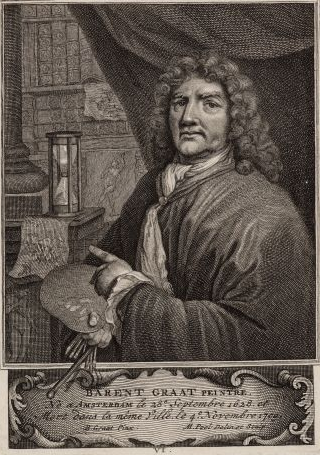Barend Graat on:
[Wikipedia]
[Google]
[Amazon]
 Barend Graat (21 September 1628,
Barend Graat (21 September 1628,
in the RKD was a Dutch painter of history- and altarpieces,
 Barend Graat was baptized in the
Barend Graat was baptized in the
in ''De groote schouburgh der Nederlantsche konstschilders en schilderessen'' (1718) by Arnold Houbraken, courtesy of the
 Barend Graat (21 September 1628,
Barend Graat (21 September 1628, Amsterdam
Amsterdam ( , , , lit. ''The Dam on the River Amstel'') is the Capital of the Netherlands, capital and Municipalities of the Netherlands, most populous city of the Netherlands, with The Hague being the seat of government. It has a population ...
– 4 November 1709, Amsterdam),Barend Graatin the RKD was a Dutch painter of history- and altarpieces,
landscapes
A landscape is the visible features of an area of land, its landforms, and how they integrate with natural or man-made features, often considered in terms of their aesthetic appeal.''New Oxford American Dictionary''. A landscape includes the p ...
and portraits in the Golden Age. He is also known as a printmaker
Printmaking is the process of creating artworks by printing, normally on paper, but also on fabric, wood, metal, and other surfaces. "Traditional printmaking" normally covers only the process of creating prints using a hand processed techniqu ...
and draughtsman.
Biography
 Barend Graat was baptized in the
Barend Graat was baptized in the Nieuwe Kerk (Amsterdam)
The Nieuwe Kerk (, ''New Church'') is a 15th-century church in Amsterdam located on Dam Square, next to the Royal Palace. Formerly a Dutch Reformed Church parish, it now belongs to the Protestant Church in the Netherlands.
Current uses
The Ni ...
.
According to Houbraken, who only saw his etchings, Graat learned to paint from his uncle Hans. Though he never traveled to Italy, he became proficient in making small Italianate landscapes and genre pieces in the manner of Pieter van Laer
Pieter Bodding van Laer (christened 14 December 1599, Haarlem – 1641 or later) was a Dutch painter and printmaker. He was active in Rome for over a decade and was known for genre scenes, animal paintings and landscapes placed in the environ ...
.Barend Graat biographyin ''De groote schouburgh der Nederlantsche konstschilders en schilderessen'' (1718) by Arnold Houbraken, courtesy of the
Digital library for Dutch literature
The Digital Library for Dutch Literature (Dutch: Digitale Bibliotheek voor de Nederlandse Letteren or DBNL) is a website (showing the abbreviation as dbnl) about Dutch language and Dutch literature. It contains thousands of literary texts, second ...
He signed his works ''B. Graat fecit''. Graat was known for his skill painting farm animals, and taught the painter Johann Heinrich Roos
Johann Heinrich Roos (29 September 1631, Otterberg – 3 October 1685, Frankfurt) was a German Baroque era landscape painter and etcher.
Biography
His family had emigrated to Amsterdam due to the Thirty Years' War in 1640.
Graat had connections with Jan Vos, a poet and
playwright
A playwright or dramatist is a person who writes plays.
Etymology
The word "play" is from Middle English pleye, from Old English plæġ, pleġa, plæġa ("play, exercise; sport, game; drama, applause"). The word "wright" is an archaic English ...
. In 1660 he married a young widow and decided not to travel to Italy, although he had made preparations. In 1664 he bought a plot and had a house build on Leidsegracht In 1668 and 1670 two daughters were baptized in a hidden Catholic church. In 1672 he was one of the painters evaluating a collection of paintings sold by Gerrit Uylenburgh
Gerrit van Uylenburgh (c. 1625 – 1679), or Gerrit Uylenburgh, was a Dutch Golden Age painter and art-dealer. He was the eldest son of Hendrick van Uylenburgh and took over the family art-dealing business after Hendrick's death and burial ...
to pronounce their authenticity. For fifteen years, the painter led an art academy at his house.
Graat lived to the great age of 81 and was active as a decorative painter, creating ''Grisailles'' and overmantel pieces for the regent families of Amsterdam, many of which survive today. His nephew Matthijs Pool
Matthijs Pool (1676–1740)Matthijs Pool
in the RKD was an engraver from the Northern Netherlands.
who married his daughter in 1708 engraved drawings that Graat made of ivory sculptures by in the RKD was an engraver from the Northern Netherlands.
...
Francis de Bossuit
Francis van Bossuit (probably 1635, Brussels - 22 September, Amsterdam) was a Flemish sculptor.Amsterdams Historisch Museum has an ''Allegory of Care'' painting in their collection from the former Old Men's Almshouse, based on an Allegorie op de Verzorging in het Oude Mannen- en Vrouwengasthuis, 1685
on the AHM website
emblem
An emblem is an abstract or representational pictorial image that represents a concept, like a moral truth, or an allegory, or a person, like a king or saint.
Emblems vs. symbols
Although the words ''emblem'' and ''symbol'' are often used in ...
by Cesare Ripa
Cesare Ripa (c. 1555, Perugia – Rome) was an Italian iconographer who worked for Cardinal Anton Maria Salviati as a cook and butler.
Life
Little is known about his life. He was born of humble origin in Perugia about 1555. The exact dat ...
.on the AHM website
References
{{DEFAULTSORT:Graat, Barend 1628 births 1709 deaths Dutch Golden Age painters Dutch male painters Painters from Amsterdam